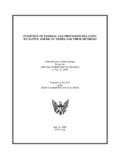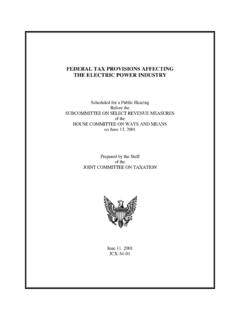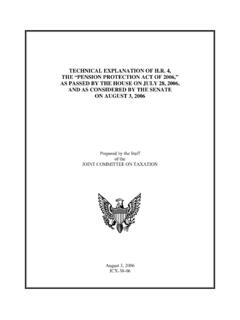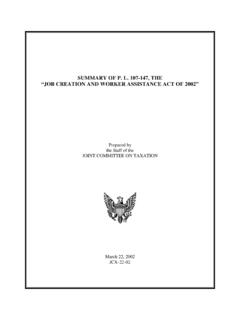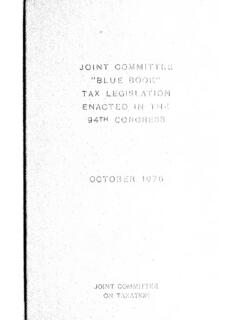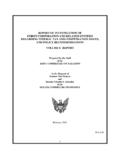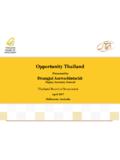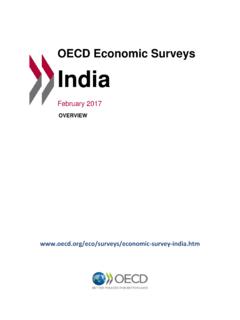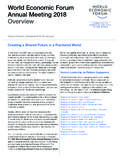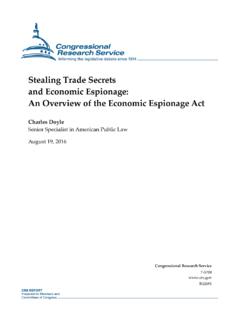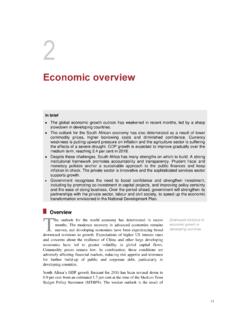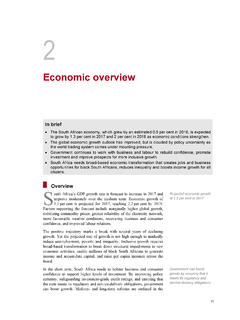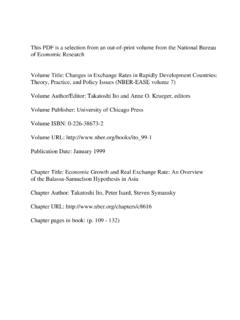Transcription of AN OVERVIEW OF THE SPECIAL TAX RULES …
1 AN OVERVIEW OF THE SPECIAL TAX RULES RELATED TO PUERTO RICO AND AN ANALYSIS OF THE TAX AND economic POLICY IMPLICATIONS OF RECENT LEGISLATIVE OPTIONS _____ Prepared by the Staff of the JOINT COMMITTEE ON TAXATION June 23, 2006 JCX-24-06 i Contents Page INTRODUCTION .. 1 I. EXECUTIVE SUMMARY .. 2 A. B. OVERVIEW of the Tax and Non-Tax RULES Related to 2 C. SPECIAL Tax RULES Related to Puerto Rico .. 3 D. Statehood, Commonwealth, and Independence Status .. 5 E. economic Analysis .. 5 F. Legislative Options .. 6 II. PRESENT LAW TAX PROVISIONS RELATED TO PUERTO RICO AND OTHER POSSESSIONS .. 13 A. OVERVIEW of Tax Provisions Relating to Puerto 13 1. In general .. 13 2. Taxation of individuals .. 13 3. Taxation of corporations .. 17 4. Employment 18 5. Excise 19 6. Taxation of Puerto Rico obligations .. 20 7. Low-income housing credit.
2 20 8. Tax 21 B. OVERVIEW of Puerto Rico Tax Law, Compiled by the Library of Congress .. 22 1. 22 2. Domestic or resident corporations .. 23 3. Nonresident foreign companies .. 27 4. Taxation of individuals .. 27 5. Revenues from income 29 6. SPECIAL rates of tax, deductions and credits .. 29 7. Puerto Rico excise and other taxes .. 32 C. OVERVIEW of Tax Provisions Relating to Other Possessions .. 37 1. territories and commonwealths .. 37 2. Virgin 39 3. 41 4. Commonwealth of the Northern Mariana 42 5. American Samoa .. 43 III. MECHANICS OF THE POSSESSION TAX CREDIT .. 45 A. The Possession Tax Credit in General .. 45 B. Qualification for the Credit .. 47 C. Computation of the Credit .. 48 IV. LEGISLATIVE HISTORY OF THE POSSESSION TAX CREDIT AND GOVERNMENT REPORTS .. 50 Page i V.
3 OVERVIEW OF FEDERAL TAX POLICY ISSUES RELATING TO economic DEVELOPMENT IN PUERTO RICO .. 58 A. OVERVIEW of economic Well Being in Puerto Rico in Comparison to the 50 States .. 58 B. Federal Tax Policy and economic Development in Puerto Rico .. 60 VI. SUMMARY OF STATEHOOD, COMMONWEALTH, AND INDEPENDENCE STATUS .. 65 A. Description of Statehood Agenda .. 65 B. Description of Commonwealth 69 C. Description of Independence Agenda .. 70 VII. RECENT PROPOSALS REGARDING THE TAX TREATMENT OF PUERTO RICO .. 72 A. Proposals Related to 72 1. Extend earned income tax credit to residents of Puerto Rico .. 72 2. Extend refundable child credit to residents of Puerto Rico with fewer than three 78 B. Proposals Related to 83 1. Extension of section 30A .. 83 2. Section 199 88 3. Section 956 93 4. Section 245 102 C. Proposal Related to Revenue Transfers .. 111 1. Repeal limitation on cover over of rum excise tax to Puerto Rico.
4 111 117 1 INTRODUCTION This pamphlet1, prepared by the staff of the Joint Committee on Taxation, provides an OVERVIEW of the SPECIAL tax RULES related to Puerto Rico and an analysis of the tax and economic policy implications of recent legislative options. This pamphlet was prepared at the request of Senate Finance Chairman Charles Grassley and Ranking Member Max Baucus. A copy of their request can be found in the Appendix of this pamphlet. Part I of the document provides an executive summary of the pamphlet. Part II discusses the present law tax provisions related to Puerto Rico and other possessions. Part III covers the mechanics of the possession tax credit. Part IV traces the legislative history of the possession tax credit and summarizes the findings included in several government reports released over the last 20 years. Part V contains an economic analysis of Federal tax policy issues relating to economic development in Puerto Rico.
5 Part VI is a description of the Puerto Rico statehood, commonwealth and independent party agendas. Part VII is an analysis of the tax and economic policy implications of recent proposals regarding the tax treatment of Puerto Rico. 1 This pamphlet may be cited as follows: Joint Committee on Taxation, An OVERVIEW of the SPECIAL Tax RULES Related to Puerto Rico and an Analysis of the Tax and economic Policy Implications of Recent Legislative Options, (JCX-24-06), June 23, 2006. 2 I. EXECUTIVE SUMMARY A. Introduction In October 2003, Senate Finance Chairman Grassley and Ranking Member Baucus, requested that the staff of the Joint Committee on Taxation (the Joint Committee staff ) prepare a report on legislative options concerning Puerto Rico. The request asked the Joint Committee staff to provide an analysis of the tax and economic policy implications of the legislative options, the revenue costs of such options, and a comparison of the options to present law relative to the States, the District of Columbia, and the other At the same time, the Chairman and Ranking Member requested that the Government Accountability Office ( GAO ) report to the Finance Committee with respect to the Puerto Rico economy, the impact of Federal tax policy on Puerto Rico, and proposed tax legislation regarding Puerto Rico.
6 The Chairman and Ranking Member requested that the Joint Committee staff complete its report following the completion of the GAO report. The GAO completed its report in May of 2006. While this pamphlet is an independent work-product of the Joint Committee staff, the legislative options included in this pamphlet represent specific proposals that have been advocated by various interested parties, including some members of Congress, with respect to stimulating economic growth in Puerto Rico. Such options do not represent recommendations of the Joint Committee staff. B. OVERVIEW of the Tax and Non-Tax RULES Related to Possessions The United States has five major possessions and commonwealths. The major possessions are American Samoa, Guam, and the Virgin Islands. The major commonwealths are Puerto Rico and the Northern Mariana Islands. Four of the five of the major possessions and commonwealths (hereafter referred to as possessions ) have a non-voting representative in the Residents of possessions are citizens, with the exception of those individuals in American Samoa who are nationals, but not In general, all Federal statutory laws apply throughout the possessions unless specifically excepted.
7 These RULES include the minimum wage standard and the requirement to use flag ships. While statutory laws apply to the possessions, and residents of 2 See Appendix for a copy of this request. 3 The Commonwealth of the Northern Mariana Islands is represented by a resident representative instead of a non-voting delegate in the House of Representatives. A bill introduced in the 109th Congress, 873, would give the Northern Mariana Islands a non-voting delegate equivalent to American Samoa, Guam, Puerto Rico, and the Virgin Islands. 4 nationals may live in the United States without restriction and naturalize as citizens under the same RULES as other resident aliens. The distinction between a national and a citizen is that a national cannot vote or hold elected office. 3 possessions are full citizens, for tax purposes the Internal Revenue Code ( the Code ) generally treats the possessions as foreign countries.
8 When the Code uses the term in a geographical sense, the United States includes only the 50 States and the District of Income derived from Puerto Rico or other possessions is ordinarily treated as foreign-source income and entities organized in Puerto Rico or other possessions are generally treated as foreign persons. Because corporations organized under the laws of Puerto Rico or other possessions are foreign corporations, they can also be treated as controlled foreign corporations ( CFCs ) for purposes of the anti-deferral regime known as subpart F. Under these anti-deferral RULES , a domestic parent company may be taxed on a current basis in the United States with respect to certain categories of passive or highly mobile income earned by its foreign subsidiaries in Puerto Rico or other possessions, regardless of whether the income has been distributed as a dividend to the domestic parent corporation. C. SPECIAL Tax RULES Related to Puerto Rico As a result of the hybrid domestic-foreign treatment of Puerto Rico persons, the general principles of taxation are qualified by many SPECIAL RULES applicable to citizens and residents of, and persons doing business in, Puerto Rico.
9 In many cases, these SPECIAL RULES have the effect of dividing tax authority between the Federal government and the government of Puerto Rico. Other RULES are designed to prevent Federal tax laws from negating tax incentives used by Puerto Rico to attract investors. The United States has also used tax incentives to assist Puerto Rico in obtaining employment producing investments by companies. The need for these SPECIAL tax incentives has been attributed, in part, to the additional costs imposed on investing in Puerto Rico because of its status as a Under prior law, certain domestic corporations with business operations in possessions could elect under Code section 936 to generally eliminate the tax (including the alternative minimum tax) on certain foreign source income which was related to their operations in the The benefit conferred to companies under section 936 is commonly referred to as the possession tax credit.
10 A majority of the corporations that benefited from the possession tax credit established operations in Puerto Rico. Companies with significant operations in Puerto Rico operated through a Puerto Rico branch of a domestic corporation. Such corporations were commonly referred to as section 936 companies. Income that was not subject to tax 5 Sec. 7701(a)(9). All Code and section references are to the Internal Revenue Code of 1986, as amended. 6 Staff of the Joint Committee on Taxation, 99th Cong., 2nd Sess., General Explanation of the Tax Reform Act of 1986, at 999-1000. 7 Some companies may still qualify for tax benefits under section 936 or section 30A for some period of time after December 31, 2005, if their current taxable year began sometime before December 31, 2005. 4 under this provision included income that was derived either from the active conduct of a trade or business within a possession or from certain investments in the possessions or in certain Caribbean Basin countries which generated qualified possession source investment income ( QPSII ).
